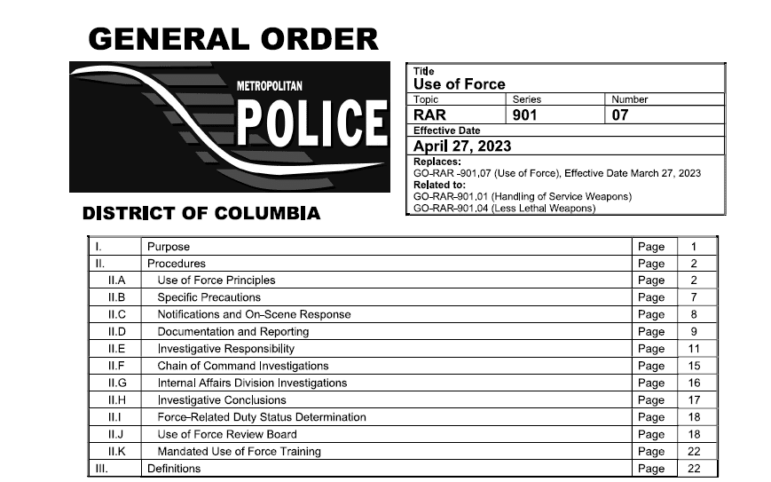Background
For years, the D.C. Metropolitan Police Department (MPD) secretly operated under a set of general and special orders which it refused to make public or provide to civil rights organizations and lawyers. The PCJF filed suit to disgorge this large body of material that the MPD sought to conceal from the public. After hard-fought litigation in which the MPD’s attorneys at the OAG fought disclosure, the PCJF succeeded in forcing these orders to be revealed to the public with a landmark ruling which pulled back the MPD’s veil of secrecy.
In her March 2012 ruling from the bench, Superior Court Judge Judith N. Macaluso called police officials’ affidavits, which were sworn under penalty of perjury and submitted to the Court in an unsuccessful effort to defeat the lawsuit, “transparently false.”
Further, Judge Macaluso said that the credibility of the statements sworn under penalty of perjury by MPD officials had “been smashed to smithereens.” The Judge repeatedly referred to the police’s sworn statements as to why documents could not be seen by the public as “false,” as well as “ridiculous,” “practically hysterical,” and “hyperbolic.”
This litigation resulted in the largest and most comprehensive release of D.C. police documents in the history of D.C.’s Freedom of Information Act. The PCJF forced the MPD to disclose nearly all of its General Orders and Special Orders and related directives that dictate how officers are to exercise their authority.
Since the litigation, the MPD has had to publish the materials on its website for public review. The public can review what the MPD internal policy dictates regarding police-resident contacts, stops and frisks, use of force, restrictions on MPD high speed vehicular pursuits, use of closed-circuit television cameras, handling of property, obligations to release persons through the citation release program, electronic recording of interrogations, use of canines, traffic safety compliance checkpoints and a range of other issues that span the full scope of police authority.
Legal Information
PCJF v. District of Columbia, Superior Court of the District of Columbia | 2009 CA 000748 B
FOIA Complaint D.C. MPD – 2009
FOIA Complaint D.C. MPD – Order Denying Motion to Dismiss 2009
FOIA Complaint D.C. MPD – Order on Cross Motions for Summary Judgment 2010
FOIA Complaint D.C. MPD – Supplemental Filing 2011
FOIA Complaint D.C. MPD- Hearing Transcript on Summary Judgment 2012
FOIA Complaint D.C. MPD – Order Granting PCJF Summary Judgment 2012
PCJF News
Court-Ordered New Release of Police Documents Available
Carl Messineo Testimony Regarding MPD’s Practices for Police Escorts
Carl Messineo on the Open Government Act of 2010
Press Coverage
Huffington Post – D.C. Police Failed To Identify Themselves In Hundreds Of Cases
Huffington Post – Jai Shankar, D.C. Man In Deportation Case, Is Free — For Now
Associated Press – DC judge orders police to release policy documents in ruling that chastises department
A District of Columbia judge has ordered the release of documents related to police policies in a blistering ruling that accused the department of making “transparently false” statements in an effort to keep the records private.
The Washington Post – Here are 159 minor things D.C. officers can arrest you for
Expired tags, as it happens, were just one of 160 misdemeanor offenses where officers can choose either to take offenders into custody or to write them what is essentially a glorified ticket.
Associated Press – DC investigating police escorts for 17 celebrities
District of Columbia police officials are investigating police escorts given to 17 celebrities since 2002 to find out who approved them, whether they were reimbursable and if there was a legitimate need for them, Chief Cathy Lanier said Thursday.
Multimedia
Carl Messineo Testimony on MPD’s Practices for Police Escorts
Testimony from Carl Messineo of the Partnership for Civil Justice Fund, speaking before the Committee on the Judiciary of the D.C. Council on improper MPD escorts to celebrities

